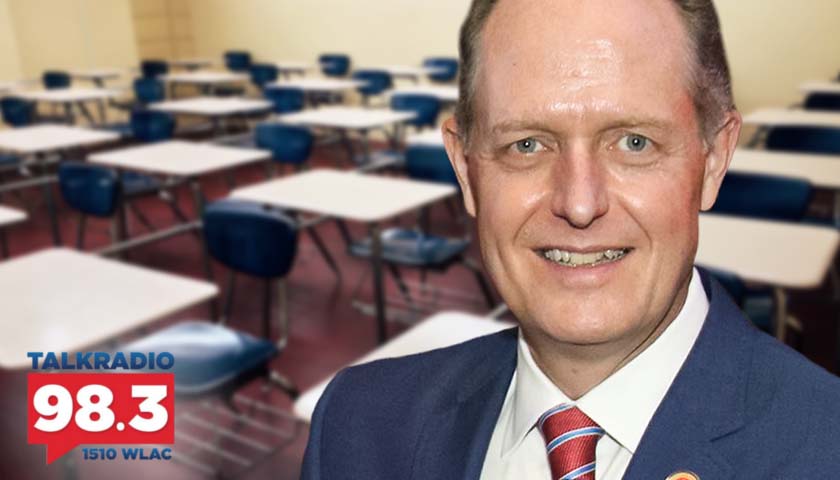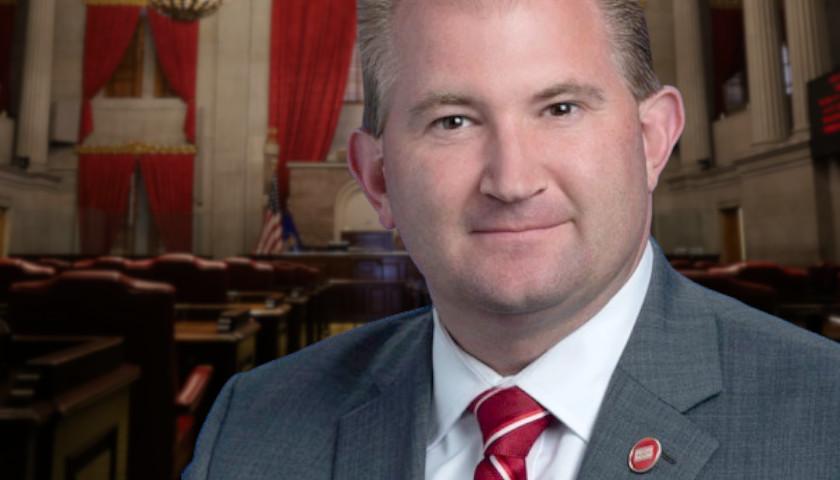Friday morning on The Tennessee Star Report with Michael Patrick Leahy – broadcast on Nashville’s Talk Radio 98.3 and 1510 WLAC weekdays from 5:00 a.m. to 8:00 a.m. – Leahy was joined on the newsmaker line by Tennessee State Senate Majority Leader Jack Johnson to weigh in on modernizing the Basic Education Plan and handling state fiscal surpluses.
Leahy: On our newsmaker line by our very good friend, State Senate Majority Leader Jack Johnson. Good morning, Jack.
Johnson: Hey, good morning, Michael. Good to be with you.
Leahy: The Tennessee General Assembly State Senate back in session. Jack, looks like a couple of priorities. Redistricting, looks like you did your work. You pass it onto the House on Monday.
Also, education funding is, I think, a big priority. Can you help break that down for us? What is going to be the big bill going on in changing the education funding formula?
Johnson: Yes, I think it really will be one of our top issues this year Michael. The governor has stated publicly that he wants to address what we refer to as the BEP formula that stands for Basic Education Plan. It’s a formula that’s been in place.
It’s been modified numerous times, but it’s in place been in place for decades. It’s the formula that determines how much state money local school districts get. Now, on average, statewide, a district gets about two thirds of the money it takes to educate a child from state dollars.
One third is generated from the local level, but it varies widely. For example, in Williamson County, it’s less than 45 percent state dollars or $0.45 of every dollar to educate a child. You’ve got other counties where it’s over 90 percent or $0.90 of every dollar.
So there’s been a lot of conversation that the formula is unfair. It’s outdated, needs to be modernized to contemplate some things that maybe weren’t so much of an issue 10, 20 or 30 years ago.
And so we’re going to take a stab at it. It’s almost like a third rail of politics, because once you start messing with it, a lot of people are going to come out of the woodwork with concerns. But it’s important that we do it. And as majority leader, I’ll be sponsoring that bill for the governor.
Leahy: Jack, one of the things that I’m concerned about here is it’s being presented also as a way of changing funding so that the funding follows the student and not necessarily the district. I’m not quite sure that’s what’s going to be presented. What can you tell us about that?
Johnson: That is absolutely one of the priorities. One of the things you’ve heard the governor say and others have said as well that one of the flaws with the system we have now is that we fund programs, we fund systems, and that shouldn’t be the priority of any funding formula.
The funding formula should be to educate the child, meaning the money is tied to and associated with the education of a particular child. And that change in emphasis, I think, will be a big part of changing the funding formula.
Another thing that’s very important is accountability. And we’ve made strides in this area, but we’ve got much more work to do. And that is holding districts accountable for performance.
We’ve got wonderful school districts in Tennessee that are doing an amazing job, and we’ve got others that are just simply failing the kids in those schools. And the funding formula should address both of those extremes of the spectrum.
Carmichael: Will the bill increase school choice opportunities, especially for lower income parents?
Johnson: It might Crom. And it’s always good to talk to you. The issue we have with that right now, the ESA bill that we passed a couple of years ago is now in litigation. It is pending before the Supreme Court.
I believe oral arguments have been heard. And so there’s somewhat of a sentiment that right now to let’s wait and see how the court opines on the pending litigation before them relative to the bill that we’ve already passed.
Because, if and I hope they don’t, I was the sponsor of that legislation as well, and I want that legislation to stand and go into effect. So it creates educational savings accounts for poor kids and low performing school districts in Davidson and Shelby counties.
But if the court is going to take some type of adverse action on it, we need to know what that is before we try to expand any program.
There’s been conversation, and we will have legislation this year relative to schools that go to remote learning and do not have in classroom instruction for kids for a certain amount of time during the year and providing a voucher or an education savings account for those kids that are zoned to a district that shuts down and does not have in person learning. So lots of conversations about more school choice. But again, we need to see what the Supreme Court is going to say.
Leahy: I’ve got a curveball for you. Are you ready?
Johnson: All right, I’m ready for a curveball.
Leahy: Here we go. Will we see anybody in the state Senate or the State House of Representatives put forward an education bill that I’ve been asking someone to do for some time, and that is a bill that would say federal government, that 10 percent of all of our funding that you sent to us, you can keep it.
We don’t want it because with your money comes with strings. Has anybody suggested the possibility of introducing such a bill this session?
Johnson: We have lots of conversations. Michael. You and I have talked about this in the past about how much of our budget is tied to federal dollars.
And as you said so accurately, every one of those dollars has strings attached to it. It’s a way that the federal government, in defiance of the 10th Amendment, controls and manipulates what states do to try to subvert federalism. So relative specifically to education.
You’re right. It’s a fairly small amount of the funding compared to some other programs say Medicaid and our TennCare program, two thirds of that is federal dollars. When it comes to K12 education, it’s a smaller amount.
If ever there was a time to contemplate that this is it because of the incredibly strong fiscal condition that the state is in. I can’t tell you it will happen. I can tell you it will be part of some broader conversations.
Leahy: You do make a very interesting point because the state and Crom and I’ve talked about this many times. Probably one of the best fiscally managed states in the country, big surpluses now, right?
Jackson: Yes. Billions of dollars.
Leahy: And so the questions are, what do you do with that? Some people are saying reduce the gas taxes which were unpopular but passed back in 2017.
And this idea of telling the feds to take their education money back, that would be a great idea. Crom wants to add one thing here.
Carmichael: Senator, with surpluses like that, if they are projected into the future, are there tax cuts on food or on energy contemplated?
Johnson: Absolutely. I’ll be quick. Yes. When you have a surplus, it’s like your family budget. Think of it that way. We as policy makers, as stewards of your tax dollars, there’s three things we can do with those surpluses.
We can put it in our savings account, which is smart. We’ll do that with some of the money. We can give it back to the taxpayers and then we can fund certain items in state government or provide increases in funding to critical areas that need it.
And I do think every year that Republicans have been in control of the Tennessee General Assembly which we’re in our 11th year now that control, we’ve cut taxes. I think you’ll see that trend continue this year.
Leahy: Well, that’d be great. Senator Jack Johnson, good friend and Senate majority leader, thank you so much for getting up so early. I know you got a lot going on, but thanks for joining us.
– – –
Tune in weekdays from 5:00 – 8:00 am to the Tennessee Star Report with Michael Patrick Leahy on Talk Radio 98.3 FM WLAC 1510. Listen online at iHeart Radio.
Photo “Sen. Jack Johnson” by Tennessee Secretary of State.





